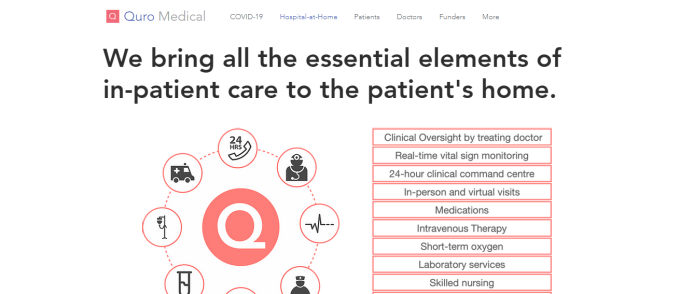For a continent with such stark inequality, Africa has seen limited innovation to increase access to healthcare and reduce healthcare delivery costs. Over the years, there has been continued investment in traditional care models despite the overwhelming evidence of inefficiency and escalating costs. The pandemic also laid these problems bare, exposing the vulnerabilities of the continent’s healthcare system.
Health tech startup Quro Medical is trying to scale alternative models for African healthcare starting from its home country, South Africa. The company, which provides services to manage ill patients in the comfort of their homes, is emerging from stealth to announce the close of its $1.1 million round. The round was led by Kenya-based Enza Capital and South African VC firm Mohau Equity Partners.
Quro Medical was founded by Dr Vuyane Mhlomi, Zikho Pali and Rob Cornish in 2018. CEO Mhlomi understood the pressing need for South African healthcare innovation from his own experience before and after he became a doctor.
It is known that hospitals in Africa experience excessive demands, which places strain on bed capacity. At the same time, it hinders effective patient treatment and recovery. Raised in Cape Town by his parents, Mhlomi experienced this firsthand. His parents suffered from chronic health conditions and he had to spend hours in clinics and hospitals waiting to see doctors.
Later, an opportunity to study medicine took him to the University of Oxford. Upon completion, he returned to South Africa where he knew the problem he faced previously was one to solve, hence Quro Medical.
“We were connected by our belief that the private healthcare sector can and should be doing more to shoulder the burden of healthcare provision in this country and on the continent generally,” Mhlomi told TechCrunch. “These escalating costs are the primary barrier to accessing healthcare in the private sector, leaving an overwhelming burden on our public health system.”
The CEO argues that acute patient care at home leads to better clinical outcomes and improved patient experience. This is the principle on which Quro Medical is established. In the long run, it wants to build the largest virtual hospital ward in Africa, with superior clinical outcomes to conventional care at a lower cost.

Unlike hospitals, getting healthcare at home can feel safer, which is an extra proposition for Quro Medical. According to COO Pali, apart from hospitals’ high costs, patients are also at risk of getting hospital-acquired infections and while it might appear that Quro Medical is offering the same old traditional home care with a mix of telemedicine service, that’s not precisely the case. Pali says the company incorporates clinical data and remote healthcare monitoring to provide real-time, data-driven clinical interventions.
Patients are admitted into the company’s care in lieu of a general ward hospital admission. Then Quro Medical makes revenue from filing a claim with medical aid and insurance companies paid via reimbursement. The healthtech startup also collects out-of-pocket payments from patients.
The pandemic reinforced the company’s importance in offering remote patient monitoring services, a significant aspect of its business that garnered a check from Enza Capital.
“As our collective healthcare systems struggle to care for patients beyond the walls of a hospital, which we’ve seen exacerbated with the onset of the COVID-19 pandemic, remote patient monitoring and healthcare delivery will undoubtedly form a core part of the lasting solution,” said Mike Mompi, partner and CEO at the firm.
Nevertheless, this period has also seen health tech startups offering out-of-hospital services struggle to have their services reimbursed. So how has Quro fared? Pretty well, apparently. The company claims to successfully convert most of its major medical schemes (health insurance) in South Africa as clients. They account for more than 90% of the total medical scheme market in the country.
Quro Medical has grown to work with about 150 doctors. Mhlomi believes his company is a first mover in Africa, meaning that he expects other players’ arrival in line with the trends in other markets. The company that has grown to work with 150 doctors now has plans to accelerate its hospital-at-home services and scale its operations across the country to meet its growing client base’s demands. It also wants to attract and retain talent and extend into other African markets.
Speaking on the investment for Mohau Equity Partners, CEO Dr Penny Moumakwa said, “We are very excited to be invested in Quro, they are a dynamic management team, building out a global medical solution, that will showcase the ability of entrepreneurs on the African continent in advanced digital healthcare.”































Comment